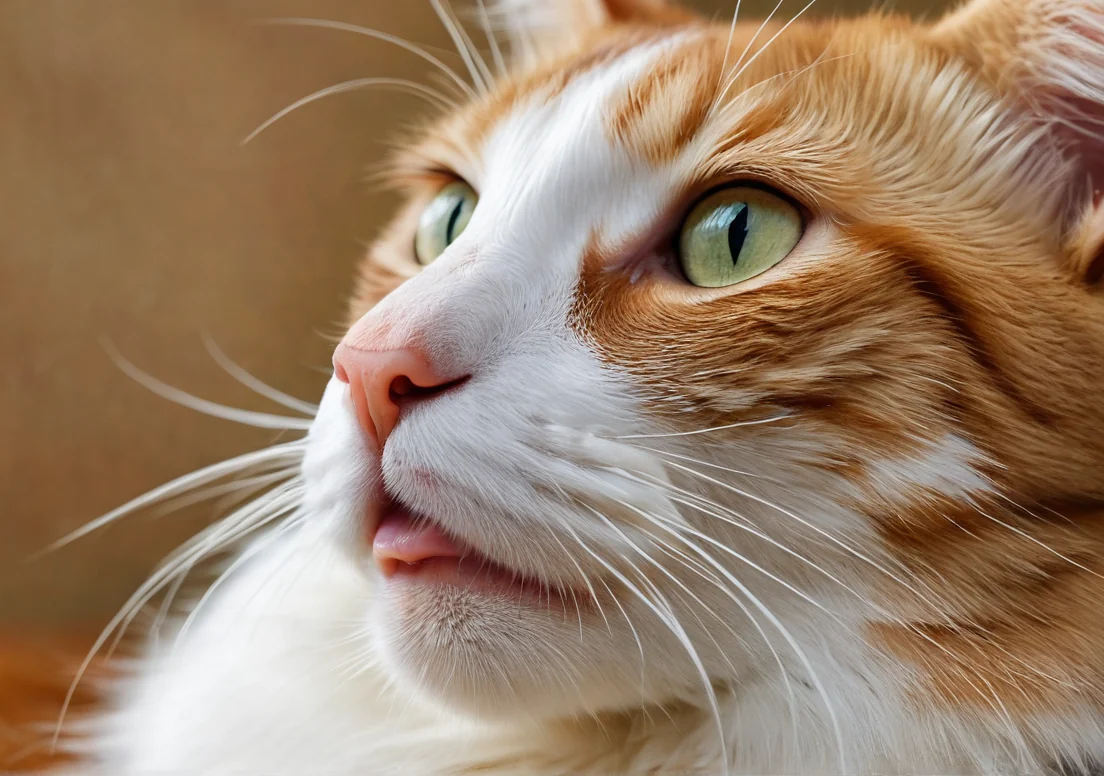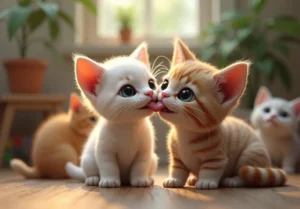Cats are mysterious creatures with quirky habits, and one behavior that often draws attention is when they lick their lips. Ever find yourself wondering what might be going on in their feline minds during these moments?
Cats lick their lips for various reasons, including signaling hunger, excitement, or even a change in emotional state. It’s a part of their communication toolkit, helping them express feelings or reactions to their environment. But is there more to this curious behavior? You bet! Let’s explore the intriguing reasons behind those lip-licking antics.

What does lip-licking signify in cats?
Lip-licking in cats is often more than just a quirky behavior; it’s a form of communication that can signal a variety of emotions and states. Cats lick their lips for several reasons, with one primary significance being anxiety or nervousness. If your feline friend suddenly starts lip-licking, it could be a sign they’re feeling stressed or uncertain about their surroundings. You might notice this behavior during vet visits or when they encounter a new pet.
On the flip side, lip-licking can also indicate contentment or relaxation, especially after they’ve enjoyed a nice meal or a treat. It serves as a way for cats to clean themselves, and simultaneously, it expresses satisfaction.
Another interesting angle is that lip-licking can occur when cats are anticipating something exciting, like a meal or playtime. It’s almost as if they’re preparing for the moment, invigorated by the thrill of what’s to come. So, keep an eye on those lip-licks; they might be telling you something about how your cat’s feeling, whether it’s blissful or a bit on edge.
Is licking a sign of hunger?
Absolutely, lip-licking can be a clear indicator that your cat is feeling hungry. When your cat licks their lips, especially while eyeing their food bowl, it’s often their way of signaling to you that they’re ready to eat. This behavior connects deeply with their hunting instincts.
In the wild, a cat might lick their lips after spotting prey, a subtle reflex that kicks in from their evolutionary past. This instinctive act can also manifest as they anticipate a meal or treat from their human companions.
Aside from signaling hunger, lip-licking can even happen when a cat sees or smells something delicious. If your kitty’s eyes widen and they start licking their lips at the mere whiff of fish or chicken from the kitchen, it’s a clear sign they want to get a taste. Their sensitivity to scents makes them acutely aware of potential meals, and that lip-licking is a way of expressing their excitement.
So, if you notice your cat frequently licking their lips, it might be time to check their food supply or treat them to something special!
How does excitement play a role?
Cats often lick their lips as a way to express excitement, especially when they’re anticipating something delightful, like treats or playtime. Think of it as their version of salivating in enthusiasm! The moment they catch a whiff of their favorite snack or see you preparing their toys, you might notice them licking their lips, almost as if they’re gearing up for the feast or fun. This behavior can be quite endearing, showcasing their eagerness and readiness to engage.
Licking their lips can also serve as a comforting ritual. Just like humans may fidget when excited, cats might do this to self-soothe while building up their anticipation. So, if your furball starts licking when you grab the treat bag, take it as a good sign—they’re ready for some fun!
Can lip-licking indicate anxiety?
Not all lip-licking moments are linked to excitement; sometimes, they can signal stress or anxiety. If a cat is feeling uneasy—perhaps due to loud noises, changes in their environment, or even a new pet—lip licking might crop up as a coping mechanism. It becomes a way for them to disperse tension and reclaim a sense of calm.
Look for other signs accompanying the lip-licking. Some common indicators of anxiety might include:
- Hiding: Seeking a quiet spot away from interaction.
- Vocalizing: Increased meowing or yowling.
- Pacing: Restless movement around their space.
- Tail Position: A lowered or tucked tail can indicate discomfort.
Being attentive to these behaviors helps gauge whether your cat is just excited for treats or managing anxiety. If you notice ongoing signs of stress, it might be worth consulting with a vet to ensure your feline friend feels safe and secure in their environment.
Why do cats lick their lips after eating?
After a tasty meal, you might notice your cat licking their lips. This simple yet intriguing behavior serves several purposes. Primarily, it’s a sign of satisfaction and enjoyment. Cats have a unique way of experiencing their food. As obligate carnivores, they have a strong instinctual need to savor meat. Licking their lips is a way to capture leftover flavors and scents.
In addition, lip-licking aids in cleaning up after a meal. Any bits of food stuck in their whiskers or on their mouth are neatly dealt with through this behavior. It’s worth noting that some cats can be a bit messy eaters, and lip-licking allows them to maintain their refined self-image.
Moreover, this behavior could indicate their heightened sense of smell and taste; cats have a much stronger olfactory sense than humans, and licking helps reintroduce those tantalizing aromas back into their experience. It also signals that they’re ready to explore or move on once they’ve had their fill.
Do cats lick their lips for grooming?
Grooming is an essential part of a cat’s daily routine, and lip-licking plays a role in their self-care efforts. Cats are known for their meticulous grooming habits, and licking their lips is part of that cleaning process. After eating, they may focus on their face, ensuring there’s nothing left to stick around.
Another interesting angle is that lip-licking can also serve as a method of stress relief. Just like how some people bite their nails or fidget, cats may lick their lips as a calming mechanism when they feel uneasy. This behavior can be seen when they’re in unfamiliar environments or around new people.
Here are a few key grooming purposes for lip-licking:
- Removing food residue: Helps eliminate any remnants left from their meal.
- Moisturizing their lips: Keeps their lips hydrated, especially in dry environments.
- Stress relief: Acts as a self-soothing behavior during moments of anxiety.
So next time you see your kitty licking their lips, remember it’s not just about the food; it’s a multi-faceted behavior tied to their overall well-being.
What does recent research say about feline behavior?
Recent studies in feline behavior shed light on why cats lick their lips more than you might think. It turns out that lip-licking often serves as a communication tool. For instance, research indicates that cats use this behavior not only when they’re hungry but also in social situations, where it may signal submission or deference to other cats. Another fascinating angle comes from studies examining the effects of human interaction. Cats observed in positive social settings—playing, being groomed, or simply cuddled—demonstrate increased lip-licking, suggesting it’s a response to comfort or enjoyment.
Moreover, some behaviorists point to lip-licking as a way for cats to process new smells and tastes. When they’re exploring their environment, licking their lips could mean they’re taking in all those fascinating scents more thoroughly, similar to what you might do when you pick up a delicious aroma. This insight not only highlights your cat’s curiosity but also reflects their mental state and potential stress or relaxation levels. Every lick could be a little comment on how they’re feeling in their unique world.
Are there health issues linked to excessive lip-licking?
Excessive lip-licking in cats isn’t always related to behavior or social interaction; it can also signal underlying health problems. Conditions such as oral pain or dental issues, like gingivitis or tooth decay, often cause a cat to lick its lips frequently. If you notice your feline friend licking their lips more than usual, pay attention. Other warning signs might include difficulty eating, pawing at their mouth, or reluctance to play.
Furthermore, nausea can be a culprit, with research suggesting that pets often lick their lips when they feel queasy. If your cat’s appetite has dropped and they’re constantly licking, it might be time to consult a vet.
Here are some key medical issues that could cause oral discomfort:
- Dental disease: Infections or decay can lead to persistent lip-licking.
- Gastrointestinal issues: Conditions like stomach upset or parasites.
- Allergic reactions: Sometimes, allergens in food or the environment trigger this behavior.
- Nervous habits: Stress and anxiety can manifest as excessive licking or grooming.
Keeping an eye on these signs will help you decide when it’s best to seek professional advice. If you’re ever in doubt about a change in your cat’s behavior, it’s wise to reach out to your veterinarian.
Fun facts about cat behavior
Cats can be pretty quirky, and their lip-licking habits offer a glimpse into their fascinating behaviors. Lip-licking isn’t just a random act; it can signal various feelings and instincts. For cats, this behavior often stems from being curious, hungry, or even stressed.
Did you know that lip-licking can be a sign of anticipation? When your cat is eyeing a treat, you might notice them licking their lips in eager expectation. They could be thinking about that tasty fish or the irresistible aroma of their favorite kibble.
Another reason for this behavior is that cats rely heavily on their sense of taste and smell. If there’s a particularly interesting smell in the air or something they’ve just tasted, a quick lick can help them process the experience. Cats have around 470 taste buds, which is not that many compared to humans, but they make the most of them!
Besides hunger and curiosity, stress or anxiety can also trigger lip-licking. If a cat feels uncomfortable or threatened, they might lick their lips as a calming mechanism, almost like how some humans do when they’re stressed.
Furthermore, as grooming enthusiasts, cats groom themselves not just for cleanliness but to spread scents. Licking their lips may be part of their self-grooming ritual, helping them feel secure and comfortable in their environment.
Finally, some medical conditions can result in excessive lip-licking. If your cat is doing it out of the ordinary or more frequently than usual, it could signal dental issues or nausea. Always good to keep an eye on how often they’re doing it—better safe than sorry!
So next time you catch your cat licking their lips, ponder on their emotions, and remember, their quirks tell a pretty unique story!
Alex, a passionate animal lover, has experience in training and understanding animal behavior. As a proud pet parent to two dogs and three cats, he founded AnimalReport.net to share insights from animal experts and expand his knowledge of the animal kingdom.




